The end is near for analogue radio... Part 3, satellite Freeview online and DAB
 Brian Butterworth published on UK Free TV
Brian Butterworth published on UK Free TV Radio in the Sky
Looking back to Astra UK Channels in 1997, we can see one interesting development for radio was the inclusion of the BBC Radio services on the Astra 1 analogue TV service.As each transponder could carry six associated audio feeds, UK Gold had BBC World Service and Radios 2, 4 and 5 Live in mono, and Living carried Radios 1 and 3 in stereo. In addition, Virgin Radio, which was a mono AM service could be heard in stereo from the Astra 1 satellites.
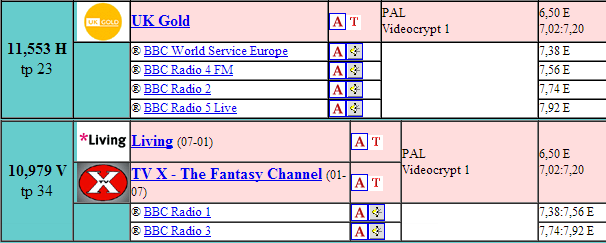
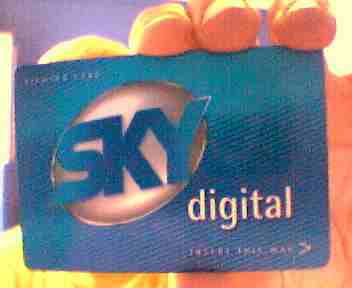 For this reason, it almost came by accident that on 1st October 1998, the new Sky Digital television service would also include lots of digital radio stations. With an abundance of capacity and the radio stations could take advantage of the MPEG2 layer III audio system (aka "MP3") and provide many radio stations in high quality stereo. The inclusion of radio stations in the channel numbers also meant that listeners could tune into radio stations without any difficult tuning issues.
For this reason, it almost came by accident that on 1st October 1998, the new Sky Digital television service would also include lots of digital radio stations. With an abundance of capacity and the radio stations could take advantage of the MPEG2 layer III audio system (aka "MP3") and provide many radio stations in high quality stereo. The inclusion of radio stations in the channel numbers also meant that listeners could tune into radio stations without any difficult tuning issues.
"Eureka"
Of course, the first "official" digital radio service developed out of the Eureka 147 project - see DAB: an introduction to the Eureka DAB System and a guide to how it works, which gave the world MPEG-1 layer II audio MPEG-1 Audio Layer II.The BBC started test transmissions of DAB in January 1990, and its national DAB multiplex went on air in 1995.
The DAB service was thought of as a way of supplying superior quality sound for the existing five BBC network radio stations. However, the very high cost of receivers, around £800 back in 1998 (£1200 in today's prices). The BBC launched digital radio in the UK in 1995 followed by national commercial multiplex operator Digital One in 1998.
"Extending Choice"
However, as early as 1992, the BBC had published "Extending Choice", which proposed that the BBC stop chasing mass audiences, and provide high quality services to audiences that the commercial broadcasters were not. This first camge to fruition in September, 1998 ( BBC News - ENTERTAINMENT - BBC unveils digital TV) when the BBC News 24, Choice and Knowledge channels were announced, and that DAB would soon have BBC Parliament (an audio service), the Asian Network and a side-channels to back-up Radio Five Live.Since then local DAB (digital radio) commercial services have become available offering non-national BBC Radio and ILR on a local basis.
Greg Dyke, the BBC DG in 2001 BBC News - TV AND RADIO - Dyke warns of digital backtrack made a decision to launch three new networks, codenamed X, Y and Z. These became 1Xtra, 6Music and BBC7 (see radio-now.co.uk )
This was a strategic decision to remove DAB from being a "sound quality" proposal to one of "listener choice". However, DAB radios still cost £300 (£420 at today's prices).
Radio Freeview
So, it was quite fortunate for these stations that the big digital terrestrial balls-up that had been ONdigital (see ONdigital Timeline - ONhistory for more) resulted in the BBC having two DTT multiplexes to fill when the replacement service Freeview launched.For quite some time, the second multiplex only carried BBC FOUR and Cbeebies, and there were plenty of bits left for all of the BBC national stations to be carried to most homes in very high quality.
As the new BBC radio stations came on air, they were also added to the digital satellite platform.
From 15 November 1999 the first national DAB commercial multiplex "Digital One" launched. This now adds another 15 national stations.
For those who are not happy with the provision of more services at lower bitrates, most UK radio stations can be listened to online at high quality. The unexpected popularity of listening to radio on Freeview has allowed many homes to sample stations that would otherwise have been exclusive to DAB. Now when people consider a DAB purchase, many "new" stations are already familiar.
The most recent figures show that 52.5% of the population tune in to digital radio every week: 65% of that is DAB, 15% on Freeview, Freesat and Sky, and 15% online. See RAJAR DATA RELEASE | QUARTER 2, 2013
How many people are listening on long and medium wave?
Due to the cuts imposed on the BBC from the Licence Fee being frozen, the BBC is looking into removing the Long and Medium Wave services.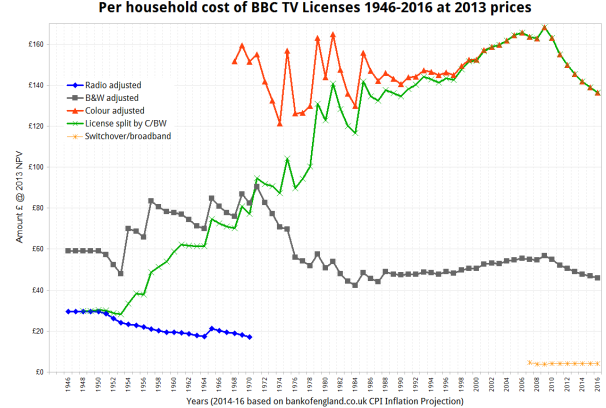
According to BBC News - BBC set to cut ... 2017 "There will also be no reinvestment in long wave, which will lead to the end of Radio 4 on LW in the long term".
"The BBC says the eventual closedown of the Long Wave service is determined not so much by the digital switchover but a dwindling supply of valves used by the Droitwich transmitter, owned and operated by Arqiva. At the last count there were only 10 left and their operating life is put at between one and 10 years" (from Will the move to digital cut off my long-wave radio? - Telegraph).
As part of the DQF process, four BBC local radio stations closed down on medium wave. At three of these there were no complaints, but at BBC Radio Mersyside, according to BBC criticised for AM radio shut-down - Media - theguardian.com 600 listeners complained.
Using this as a baseline, 600 listeners from a potential 1,664,000 (from RAJAR) pairs of ears, makes 0.0361% of the population.
If we multiply this up by 53,205,000 (that RAJAR national 16+ figure) we get 19,200.
If there are really only 19,200 people listening to long and medium wave, then it's probably time to turn off the service.
If you look at it the other way, then a service proposal to cover 20,000 people in the UK from 73 transmitters wouldn't be regarded as economic.
It may also be worth noting that if you can't get your BBC radio stations from DAB, or satellite, or Freeview, or online: it is doubtful you are paying for a TV Licence.
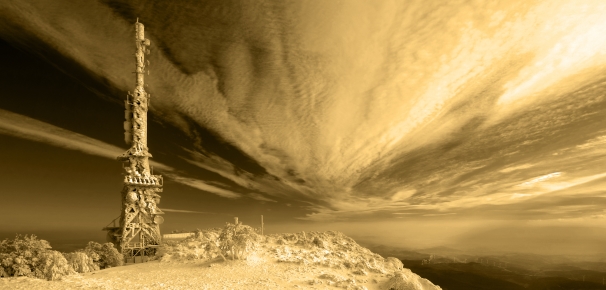
So why switch of FM/VHF?
In the last part, The end is near for analogue radio... radio gets very high - Digital radio the limited FM radio spectrum prevents the UK having more than 5 national FM stations.DAB, with just two national multiplexes provides 25 stations. There is space reserved for a second national DAB service, which could add another 15.
In London, there are an additional three DAB multiplexes adding brining the total stations to over 55. Central Scotland has 45 stations.
Over the last few years, the BBC and commercial operators have been making the DAB local radio network match the FM local radio network - Ofcom - Annex B. Local DAB build-out plans. There are still a few areas of the UK to cover - notably Derbyshire and West Wales - but both in car, and in home, DAB reception is as good as or better than FM.
But there are 758 FM transmitting masts in the UK, some carrying as many as 12 FM stations (Black Hill (North Lanarkshire, Scotland) analogue radio transmitter ) This is a considerable cost for the radio broadcasters because DAB is as low as one-sixth of the cost of FM transmission.
"Transmission will be cheaper, too. DAB can be transmitted at lower power than today's FM and AM signals yet with no loss in geographic coverage, which means less cost to the broadcaster (and less power consumption means DAB is more environmentally friendly than conventional FM and AM)." - WorldDMB - Frequently Asked Questions (FAQ)
The current plans are to announce a rolling switch off of VHF for the BBC and commercial broadcasters: the switch off will occur areas where digital radio use is highest. Community radio stations (which are not profit making) will continue on FM.
However, the recent success of the Small Scale DAB The potential for lower-cost transmitting stations in support of DAB rollout suggests that community radio could now be very cheaply provided by DAB too.
Now in 2013, you can grab a DAB radio from your local supermarket for £20 ASDA Portable DAB Radio - Radio - ASDA direct - one sixtieths of the cost in 1998, there is little standing in the way of radio choice being available in every UK home.
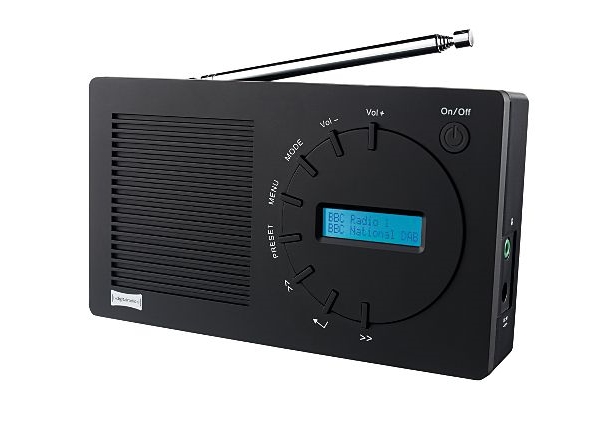
Help with TV/radio stations?
In this section
Thursday, 29 August 2013
Trevor Harris: you don't seem to have heard of ETSI 300 401 sub-section 8.1.6 which does the same as TA on RDS.
When did Ofcom bribe anyone? That would be illegal for them to do.
The BBC don't use "digital radio" and DAB interchangeably. Please prove some evidence for such a claim. The web site is always very clear on the matter.
And there were a whole host of stations that were going on the second national multiplex... They were listed in the applications.
| link to this comment |
T
Terry11:26 PM
Brian... a year or so ago when I dared suggest that FM far outstrips DAB in sound quality you put mine and some other posts in to some forum that you entitled 'Deluded listeners' or something similar... I don't remember exactly. I thought at the time your actions were way out of line.
I like this site... it's extremely helpful and informative and now once again we have some very relevant posts expressing concerns over DAB and its 'quality' compared with FM.
Trevor and Russ express concerns about the whole DAB business but you seem inflexible in your replies in that you will not even attempt to understand why people are concerned.
There is absolutely no doubt that FM far outstrips DAB as a listening experience... if it just boils down to 'choice'... well that's another matter as Mr Murdoch will tell you.
'Science' may be able to 'show' that there is extra clarity and detail in a DAB broadcast but if you really listen and listen to what your ears tell you FM is simply far superior. One can publish all the technosnore information about DAB they wish but there's currently nothing better than FM.
| link to this comment |
Terry: I just checked and it was two and a half years ago - 27 Feb 2011 and I locked a thread because there was a single contributor who was "trolling".
Some comments that had replied were locked too.
Sometimes i have to made decision to ensure that readers and contributors are not driven away.
| link to this comment |
Friday, 30 August 2013
M
MikeB12:02 AM
Terry: Is there any actual evidence that 'FM far outstrips DAB as a listening experience'? You've expressed an opinion (and arguably a lot of handwaving), but for most people, the quality difference between the two systems is something that barely registers, if at all.
I've just switched between Radio 3 on FM and on DAB - and yes, the FM is a slightly richer sound, but since DAB squeezes the very high/low frequencies, thats understandable, but for most listening (speech particularly), it makes no difference. If I'm that keen on listening to Radio 3 at top quality on my radios single speaker, then I'll use its internet function.
The bottom line is that DAB gives me 55 stations, FM gives me far less, and provided I get a decent signal, there is no hiss, etc. For most people, thats what matters, and when they are buying a radio today, very few chose the FM only option, because whats the point?
| link to this comment |
M
Michael S1:28 AM
Thanks for these series of articles Brian... very informative and a good read,
I'll not repeat my comments from "part 1" but it does amaze and, to an extent, amuse me how vocal some of the anti-DAB guys are.
Earlier this evening I did some of my own comparisons between FM and DAB on BBC Radio 3 using my Pure Sirocco 550. The difference is noticeable - but I have to say... I prefer the 192Kbps DAB.
It seems that what some people describe as "a warm" sound on FM, I hear as more muffled; an indistinctness.
Some of the more ranting comments remind me of a Telecoms Manager at my company back in the early 90's bemoaning the shutdown of the Vodafone analogue mobile network. He didn't want to lose his fitted car-phone because "the range is much better and I can shout through the crackling and interference!" Needless to say he eventually came to love the features on his GSM phone :-)
It also amuses me when people complain about mono on speech stations like Talk Sport. If the commentary is coming from a sports ground then it's probably via an ISDN line using a G.722 codec - at least their FM radios "warm it up" a bit! :-)
And as for anybody who is still saying analogue recordings are better than CD... well, I think we can safely disregard any of their comments!
As a volunteer at my local community radio station I love FM - it's so useful being able to do noisy outside broadcasts and use the broadcast signal as a monitor (assuming an ISDN backhaul) - much cheaper and more reliable than wireless monitor headsets!
But I also love DAB. I love the fact I have the choice of 50 stations and, if I'm honest, I admire the design work that went in to a system that's over 20 years old and still works so well.
FM isn't dead yet, but eventually it will need to shuffle off - along with, I suspect, most of the trolls who put so much effort in trying to suggest DAB has no future.
| link to this comment |
M
Mark8:06 AM
@ Ben Hardaker
The Lincolnshire DAB mux will launch in 2014.
| link to this comment |
C
Charles Stuart9:05 AM
Bristol
"But why not just listen to the existing audio services on DVB-T and have done with it?"
Because there are not enough of them and utilizing DVB-T2 for this purpose seems, at first glance, to be an efficient use of bandwidth, using a technology people already have. The big anti-DAB argument is that quality is sacrificed in order to provide quantity. DAB+ is one answer but it's not used in the UK. DVB-T2 is used in the UK and provides a possible means to provide quality and quantity. And, as Freeview has shown, radio over DVB is very good.
| link to this comment |
Charles's: mapC's Freeview map terrainC's terrain plot wavesC's frequency data C's Freeview Detailed Coverage
Charles Stuart: I would venture that:
The power requirements for DVB-T2 decoding are greater than for the "simple" COFDM used in DAB.
I'm not convinced you could run a national SFN with DVB-T2.
All of the channels that are in the lower DDR range, including C36, will be required for DTT when the 700MHz band is handed over to 4G in 2019.
I don't think that DVB-T2 was ever designed for high-speed mobile reception.
It's worth remembering that there the only difference between DAB and DAB+ is a "codec". It replaces MP2 with AAC.
In the future when enough people have receivers that can "play" an AAC stream, it's a very simple matter to change the services over.
You can even do it on a station-by-station basis.
| link to this comment |
T
Trevor Harris9:53 AM
The traffic service is defined in the 2006 spec but it has not been implemented by the BBC. I don't know of any uk reciever that supports it in any case.
Infact there was a traffic service on DAB but the Government scraped it in 2011.
DAB traffic info axed The Register
That article also descibes the commercial operators attitude to DAB.
Looking into my crystal ball I would say that in the near future the BBC will have to continue to duplicate transmissions on both FM and DAB. In the longer term DRM+ may be introduced into band 2. DRM+ and FM can coexist in the same band.
I think eventually the internet will be the medium of choice.
It is interesting to see the rise of "connected tv". Internet speeds are increasing with 1gb/s available in some areas. This could make satellite and terestrial broadcasting redundant.
| link to this comment |
Select more comments
Your comment please!